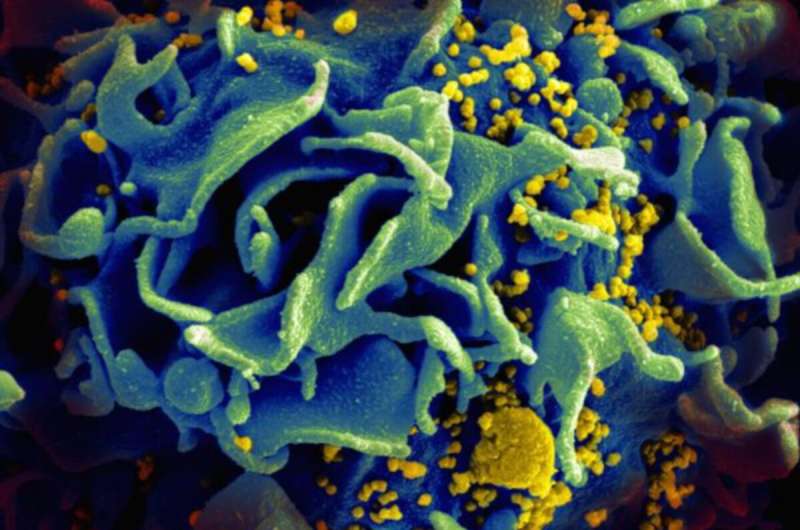Study confirms correlates of risk associated with decrease in HIV transmission

Immune responses that are associated with a decreased risk of infection are called correlates of protection (CoP). Clinical trials that measure vaccine-induced antibody and cell-mediated immune responses help to define CoP to HIV, which are necessary to assess the efficacy of a promising HIV vaccine candidate.A pilot study led by senior authors Georgia Tomaras and Peter Gilbert and first authors Scott Neidich, Youyi Fong and Shuying Li of the NIAID-funded HIV Vaccine Trials Network (HVTN) demonstrated that an increase in three antibody-mediated immune responses (antibody-mediated Fcƴ receptor [FcƴR] recruitment, antibody-dependent cellular phagocytosis [ADCP], and anti-Env IgG3) correlated with a decrease in HIV transmission.
To date, only the RV144/Thai trial has demonstrated moderate efficacy for an experimental HIV vaccine. RV144 identified two primary immune correlates—IgG antibodies to the variable regions of HIV Env correlated with decreased risk of HIV transmission, and plasma IgA to Env correlated with decreased vaccine efficacy. As only one HIV vaccine trial has shown efficacy thus far, the RV144 immune correlates should be corroborated in an independent study to confirm the CoP are true surrogate markers for protection from HIV acquisition.
The HVTN 505 trial tested a DNA and adenovirus 5 (Ad5) vaccine regimen in men at risk of HIV acquisition in the Americas. Despite not demonstrating HIV vaccine efficacy, HVTN 505 can provide insight into possible CoP by comparing participants who were protected with those who acquired HIV during the study. The new pilot study set out to determine whether antibody Fc effector functions observed in HVTN 505 correlated with decreased risk of HIV transmission. The results were published in The Journal of Clinical Investigation.
To test whether the antibody functions were independent correlates of HIV risk, ADCP and antibody-mediated FcƴR recruitment (antibody-mediated immune responses) were statistically assessed and the polyfunctionality score for CD4+ and CD8+ T cells (cellular-mediated immune responses) were measured. The authors found that both the antibody- and cellular-mediated immune responses significantly correlated with the decreased transmission of HIV. Individual Env IgG3 (subclass of antibody) measurements significantly correlated with reduced risk of HIV transmission. Env IgA responses modulated antibody Fc effector functions supporting the previously identified RV144 IgA CoR. To best predict the transmission of HIV, this study demonstrated that measuring both antibody and cellular mediated immune responses are necessary. The antibody and cellular mediated immune responses at four weeks after the final vaccination (month 7) were determined in a blinded case control study of 125 HVTN 505 participants who did not acquire HIV and 25 participants who acquired HIV.
Previous studies confirmed that vaccine-induced CD8+ T cells impact viral load; however it is not known if antibody Fc effector functions can play a protective role after HIV infection in humans. The researchers examined the relationship between the strength of antibody Fc effector functions with viral load (VL) set point in those vaccinees who acquired HIV. The pilot study confirmed that antibody effector function significantly correlated with lower VL set point in those vaccinees who acquired HIV.
Notably, of the antibody responses, ADCP and IgG3 were among the strongest correlates associated with the decrease in HIV transmission; however, Fc?RIIa engagement was the only correlate of decreased VL in infected vaccinees. ADCP, IgG3 and FcR engagement are emerging hypotheses that can be tested as a CoP upon completion of the HVTN 702, HVTN 705, and HVTN 706 large-scale HIV vaccine efficacy trials underway globally.
More information: Scott D. Neidich et al. Antibody Fc effector functions and IgG3 associate with decreased HIV-1 risk, Journal of Clinical Investigation (2019). DOI: 10.1172/JCI126391


















